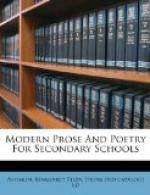The love that cast an aureole
Round one who,
longer to endure,
Called mirth to ease his ceaseless
dole,
Yet kept his nobler
purpose sure.
Lo, as I gaze, the statured
man,
Built up from
yon large hand, appears;
A type that Nature wills to
plan
But once in all
a people’s years.
What better than this voiceless
cast
To tell of such
a one as he,
Since through its living semblance
passed
The thought that
bade a race be free!
NOTES
=this cast=:—A cast of Lincoln’s hand was made by Leonard W. Volk, in 1860, on the Sunday following the nomination of Lincoln for the Presidency. The original, in bronze, can be seen at the National Museum in Washington. Various copies have been made in plaster. An anecdote concerning one of these is told on page 107 of William Dean Howells’s Literary Friends and Acquaintances; facing page 106 of the same book there is an interesting picture. In the Critic, volume 44, page 510, there is an article by Isabel Moore, entitled Hands that have Done Things; a picture of Lincoln’s hand, in plaster, is given in the course of this article.
=Anak=:—The sons of Anak are spoken of in the Bible as a race of giants. See Numbers, 13:33; Deuteronomy, 9:2.
=Atlas=:—In Greek story, the giant who held the world on his shoulders.
=the thought=:—The Emancipation Proclamation.
SUGGESTIONS FOR STUDY
Read the poem through from beginning to end. Then go back to the first and study it more carefully. Notice that there is no pause at the end of the first stanza. In the ninth line, mentally put in how after know. Explain what is said about Freedom’s training her son. Loftier office: Loftier than what? Note that might is a noun. Mentally insert hand after courtier’s. Can you tell from the hand of a person whether he has suffered or not? What does the author mean here by “the weight of Atlas”? What is a “formless grace”? Is the expression appropriate here? What characteristic of Lincoln is referred to in the line beginning “Called mirth”? Are great men so rare as the author seems to think? Why is the cast a good means of telling of “such a one as he”? Look carefully at one of Lincoln’s portraits, and then read this poem aloud to yourself.
Compare this poem with the sonnet On the Life-Mask of Abraham Lincoln, page 210.




